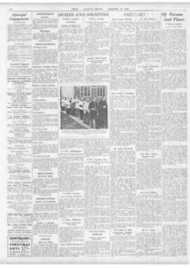Page 10, 16th December 1938
Page 10

Report an error
Noticed an error on this page?If you've noticed an error in this article please click here to report it.
Tags
Share
Related articles
The Film
The Film
Ballet Behind The Footlights
Censored Subjects—
The Film
France enlivens fiction with material that England uses for documentary films
By Iris Conlay Critic CATI-10arC HERALD Film
That Certain Age
1STRIBUTORS talk about " heart interest " in con nection with That Certain Age. Stiff conventional sort of language the boys talk over their business, but it's clear to you and I, too, that this film is bringing " romance " into the young Deanna Durbin's film life. And so things arc. Before we can get down to tacks let's lay the story out. It's light enough, anyway, and doesn't count for much. Deanna (Alice), age sixteen years, living at home with nice normal parents (just like everyone's parents except that they have butlers and guest houses and stables and Much Money) suddenly gets tired of her s choolgirlish friends and occupations and falls in love with one of her father's friends—a hard-boiled newspaper reporter who has the experience of Cairo and Cathay behind him. How to disillusion poor Deanna is everyone's problem, and it is done with a sudden the end which temporcures, too, and speedily quick twist at arily hurts but sends Deanna theatricals and
Deanna Durbin
quick twist at arily hurts but sends Deanna theatricals and
back to Boy Scout banana splits.
nEANNA, at sixteen, is just as engageing as Deanna at fourteen. With bated breath we all wait for Deanna's " awkward" age, but she sails through all the stages of schoolgirl clumsiness and schoolgirl blushes with as much natural poise as a young gazelle. No wonder parents may be found in envious rows at any cinema Where Deanna's bills hang out. She is the perfect daughter who is obedient without being priggish, pretty without sophisticated airs, wears her clothes instead of upholstering them, is talented without being difficult . . . what more could fortune endow a daughter with. Of the " first romance " stunt, well, it is a little embarrassing when comedy does not intervene to level things out. But we are not meant to take the little tragedy seriously—Deanna recovers quickly enough to give the balance, and the things to remember in That Certain. Age are still the smiles of the Durbin, not her tears, HER songs, too, are as important as her smiles. With lovely freedom she flings off Bence Les riles de Cadiz and a waltz from Romeo and Juliet by Gounod. I have a feeling that the Scout movement in this country will soon catch on to Be a Good Scout; they are slow if they don't recognize its value forthwith and adopt it. The butcher boy will have it if they don't, anyway. So goes another stage in Deanna's life, a life which almost grows in front of a movie camera. In our next. picture we want a coming of age celebration, then a wedding, then the family round the hearth, and finally Darby and Durbin celebrate their golden wedding.
I expect it is all taped by now by Joe Pasternac, who has arranged all Deanna's productions to date. We need not worry, surely.
Leicester Square
Entree des Artistes
THE Paris Conservatoire, famous French academy of dramatic art furnishes all the distinction of Marc Allegret's latest film — Entree des At-Mites. (Marc Allegret made Gribouale and Orage). It furnishes too a great topic for discussion about the difference between French and English methods of using their material. For instance, Entree des Artistes tells a rather novelettish story of two students in love with the same man; of the suicide of the student who "loved and lost " staged to look like melodramatic murder. But instead of the film falling to bits on its tiresome, unreal plot, just the opposite happens—its production against the essentially true background of student existence at the Conservatoire triumphs over the poverty of the tale and brings Entree des Artistes at least into near front rank of French films. In England things would have been arranged differently. In the first place should we have recognized such a setting as a school of dramatic art as material for film? Yes, maybe we should have had enough. petspianeity to Sof` film's possibility. But what would we have done Turned it to account as reality background for unreal fiction/ No. We should have made a superb, but slightly precious documentary out of it and so lost 90 per cent. of our audience.
IN Entree des Artiste& we see the examination day; the press of students pouring into the halls accompanied by advising friends with loud voices; by parents full of solicitude; by old student whose experience is sought after and who never enjoyed such popularity before. Afterwards rehearsals. The same words spoken so many times in so many varying ways. The master, philosophic, understanding, sardonic, and quick-tempered in turn with his pupils—this is Louis Jouvet at his highest. The students, mixed between the orphan whose guardians keep a laundry, who beat her when she escapes to the
blog comments powered by Disqus

















